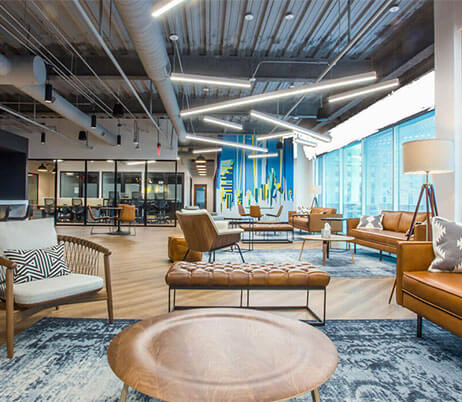The Dawn of a New Workspace Era
As we usher in a new era of work environments, the concept of cowering spaces is gaining considerable traction. Far removed from the traditional office setup, these spaces encourage a unique blend of personal comfort, productivity, and team collaboration. But is this concept really worth the investment? Is having a coworking space truly a good idea?
Let's delve deeper.
A coworking space is a shared work environment that facilitates collaboration and networking. It is designed to cater to the diverse needs of freelancers, entrepreneurs, remote workers, and companies of all sizes. The space typically includes open seating areas that encourage interaction and collaboration, dedicated desks for those seeking a regular personal workspace, and private offices that can be used by individuals or entire companies seeking a more private, yet shared environment. These spaces promote a sense of community, creativity, and productivity while providing all the amenities of a modern office and the flexibility to choose a work setup that best suits each member's needs.
Navigating The Productivity Maze
Our collective struggle with productivity is well-documented. A 2019 report by Atlassian found that workers spend only around 60% of their office time actually working. Inefficient meetings, constant interruptions, and workplace stressors often get in the way.
But coworking spaces seem to present a promising solution.
Spaces like Venture X provide a secluded spot away from the chatter, ringing phones, and spontaneous discussions - common distractions in open-plan offices. They allow employees to dive deep into their tasks, fostering an atmosphere of focus and efficiency. Given that the average employee is interrupted every 11 minutes, according to Gloria Mark, a researcher at the University of California, Irvine, this solitude can be a gold mine for employers looking to boost output.
The Science of Working Better
Understanding the cognitive science behind work can help us appreciate the merits of cowering spaces. The human brain, as neuroscientists posit, is not designed for multitasking. Our mental performance declines when we try to juggle too many tasks at once, a common demand in bustling offices.
Coworking spaces, with their expertly engineered tranquility, facilitate 'deep work,' a term coined by productivity expert Cal Newport. This state, where we are wholly immersed in our work, significantly enhances creativity and productivity. It's a state where innovative solutions and breakthrough ideas are born, making cowering spaces an incubator for brilliance.
Beyond the Cubicle: The Emergence of Cowering Spaces
The journey from traditional offices to open-plan layouts, and now to cowering spaces, tells an interesting tale. While open-plan offices have been celebrated for encouraging collaboration, they've also been criticized for their noise levels and lack of privacy, hindering deep work.
The shift towards cowering spaces is a response to these shortcomings. An insightful study by Gensler, an architecture and design firm, revealed that 90% of workers believe effective workplace design is critical to productivity and engagement. Given these facts, cowering spaces aren't merely a trend; they're a necessary evolution in office design.
Collaborative Solitude: A Balance of Interaction and Isolation
Cowering spaces offer the best of both worlds. While they provide the isolation necessary for concentration, they don't completely cut off employees from the team. These spaces are typically within the larger office, enabling a seamless transition between focused work and team collaboration.
As per a report by Harvard Business Review, both individual focus and collaboration are essential to organizational success. It's like a well-choreographed dance, and cowering spaces seem to have nailed the rhythm.
Resilience in the Time of Remote Work
The global pandemic and the resultant shift to remote work have further highlighted the relevance of coworking spaces. According to a survey by Buffer, while remote workers enjoy the flexibility, 20% struggle with unplugging from work, indicating a blurred work-life balance.
Cowering spaces, in this context, help establish clear boundaries. They offer a dedicated, comfortable space for work within the confines of the home, enabling better work-life balance and mental health.
The Future is Cowering
The office of the future, it seems, is a mosaic of collaborative spaces, personal desks, and cowering spaces. An inclusive workspace that caters to different working styles and tasks. According to a Deloitte survey, 76% of professionals believe that a range of workspace options is important for productivity.
Cowering spaces are not a fad; they're the way forward. Their contribution to productivity, collaboration, work-life balance, and employee satisfaction make them a wise choice for modern work environments.
Implementation: Transforming Your Workspace
Implementing cowering spaces in your office doesn't necessarily mean a complete overhaul. A few changes to the existing setup could suffice. Sound-proof partitions, comfortable chairs, and noise-canceling headphones can create effective cowering spaces.
Given the range of benefits they offer, investing in cowering spaces is investing in your team's productivity and well-being. An environment that respects personal focus as much as team interaction will undeniably attract and retain the best talent.
If you're ready to take productivity to the next level, contact us today.
